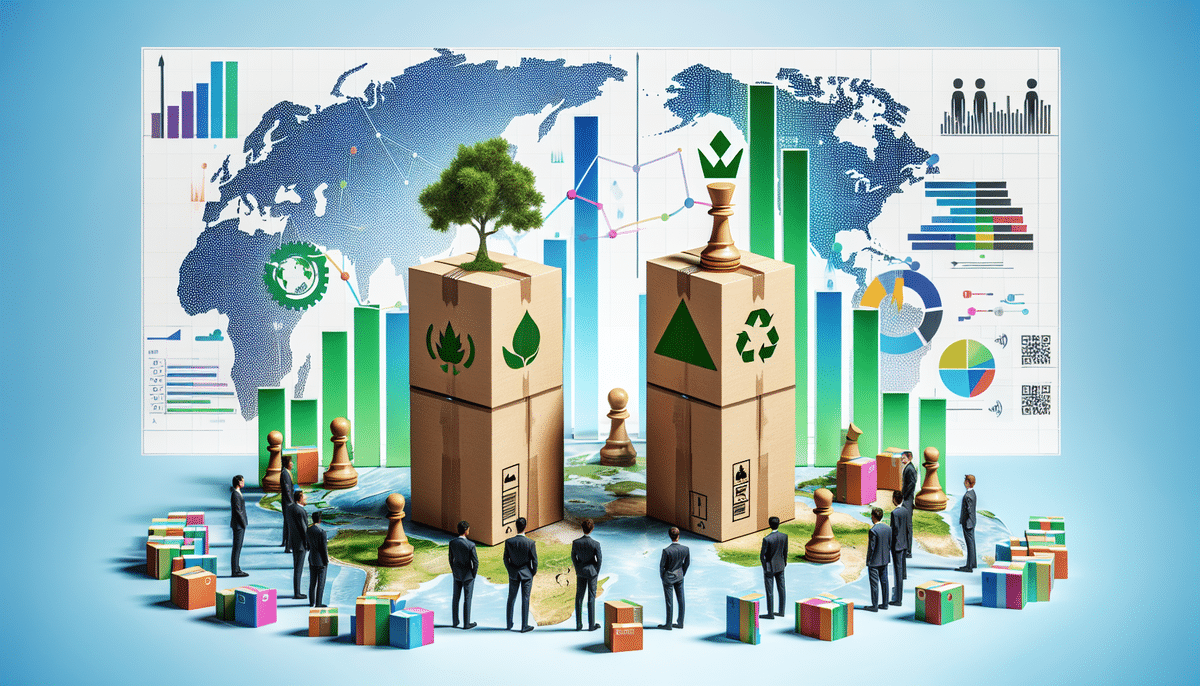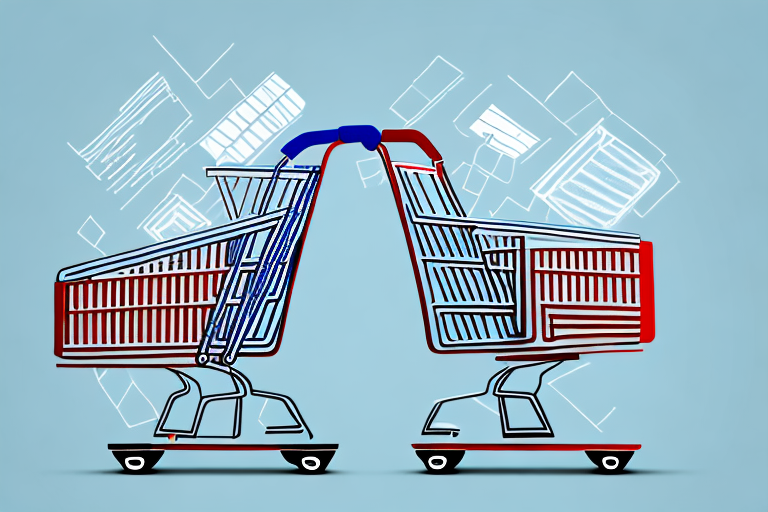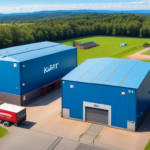WestRock vs Georgia-Pacific: Comprehensive Industry Analysis
In the competitive landscape of the paper and packaging industry, WestRock and Georgia-Pacific are two dominant players. While both companies operate within the same sector, they exhibit distinct differences in their product offerings, financial performance, sustainability initiatives, and leadership strategies. This article provides an in-depth analysis of WestRock and Georgia-Pacific, highlighting what sets them apart and how they navigate the evolving market dynamics.
Company Histories and Evolution
WestRock
WestRock was established in 2015 through the merger of RockTenn and MeadWestvaco, combining decades of expertise in the packaging industry. RockTenn, founded in 1973, and MeadWestvaco, established in 2002, merged to create one of the largest packaging companies in the United States. As of 2023, WestRock continues to expand its global footprint, focusing on sustainable packaging solutions.
Georgia-Pacific
Georgia-Pacific has a rich history dating back to 1927, initially focusing on lumber production. Over the decades, the company diversified into paper, packaging, and building materials, becoming a major player in the industry. Headquartered in Atlanta, Georgia, Georgia-Pacific has consistently prioritized innovation and sustainability in its operations.
Product and Service Offerings
WestRock
WestRock offers a diverse range of paperboard and packaging products, including:
- Consumer packaging
- Foodservice packaging
- Corrugated boxes
- Sustainable packaging solutions
The company is renowned for its innovative packaging designs that cater to various industries, including food and beverage, healthcare, and e-commerce.
Georgia-Pacific
Georgia-Pacific manufactures a wide array of products, such as:
- Toilet paper and paper towels
- Napkins
- Corrugated packaging
- Building materials
- Chemical products
The company's extensive product portfolio serves sectors like foodservice, healthcare, retail, and industrial markets.
Financial Performance
WestRock
As of 2023, WestRock's market capitalization is approximately $20 billion. In the fiscal year 2022, WestRock reported revenues of $22 billion and a net income of $900 million. The company has shown resilience and steady growth, even amidst global economic challenges.
Georgia-Pacific
Georgia-Pacific, a privately held company under Koch Industries, does not publicly disclose detailed financials. However, it is estimated to generate annual revenues exceeding $30 billion, positioning it as a key leader in the paper and packaging sector.
Sustainability Initiatives
WestRock
WestRock is committed to sustainability, with initiatives aimed at:
- Reducing greenhouse gas emissions by 30% by 2030
- Increasing the use of renewable energy sources
- Implementing water recycling systems to achieve a 20% reduction in water usage
The company has invested heavily in research and development to create environmentally friendly packaging solutions, aligning with global sustainability goals.
Georgia-Pacific
Georgia-Pacific prioritizes responsible environmental practices, including:
- Sourcing 100% of wood fiber from certified sustainable sources by 2025
- Reducing greenhouse gas emissions by 30% by 2030
- Utilizing recycled water in manufacturing processes, achieving a 20% reduction in water usage since 2010
The company's dedication to sustainability has earned it accolades such as the Sustainable Forestry Initiative's Leadership in Conservation Award.
Technological Advancements and Innovation
WestRock
WestRock leverages advanced technologies to enhance operational efficiency and product quality:
- Digital Tracking Systems: Monitor supply chains to ensure responsible material sourcing.
- Virtual Reality Training: Utilize VR simulations for employee safety training.
- Innovative Packaging Solutions: Development of microwaveable and eco-friendly packaging options.
Georgia-Pacific
Georgia-Pacific integrates cutting-edge technologies to maintain its competitive edge:
- Renewable Energy Investment: Adoption of renewable energy sources to power manufacturing facilities.
- Advanced Water Treatment: Employs sophisticated water treatment technologies to minimize environmental impact.
- Product Innovation: Introduction of paper-based straws and compostable napkins to meet consumer demand for sustainable products.
Leadership and Management
WestRock
The leadership team at WestRock brings extensive industry experience:
- Steven C. Voorhees, CEO: With over thirty years in the paper and packaging industry, Voorhees has led the company since its inception.
- Ward Dickson, CFO: Serving since 2005, Dickson has over twenty years of experience in finance and accounting.
- James B. Porter, COO: A long-standing member since 1984, Porter has held various leadership roles within the company.
Georgia-Pacific
Georgia-Pacific's leadership is equally robust:
- Robert Gamgort, CEO: Appointed in 2020, Gamgort previously led Keurig Dr Pepper, bringing a wealth of corporate leadership experience.
- Pedro Reinhard, CFO: With over thirty years in finance, Reinhard oversees the company's financial strategies.
- Fritz Duda, Chief Legal Officer: Serving since 2002, Duda has significant expertise in corporate law and governance.
Market Position and Future Outlook
Market Share
According to IBISWorld, as of 2021, Georgia-Pacific held a market share of 13.2% in the U.S. paper product manufacturing industry, while WestRock held 8.9%. WestRock's strategic mergers and acquisitions have facilitated steady growth, increasing its market presence.
Expansion Plans
- WestRock: Expanded its portfolio by acquiring KapStone Paper and Packaging Corp. in 2018, enhancing product offerings and global reach.
- Georgia-Pacific: Announced plans to expand paper mills in Green Bay, Wisconsin, and Muskogee, Oklahoma, focusing on sustainable practices and increased production capacity.
Future Outlook
The paper and packaging industry is poised for growth driven by sustainability and innovation. Both WestRock and Georgia-Pacific are well-positioned to capitalize on these trends through their commitment to eco-friendly practices, technological advancements, and strategic expansions. Future projections indicate continued growth and resilience for both companies as they adapt to market demands and environmental regulations.
Challenges and Legal Considerations
Industry Challenges
- Sustainability Pressures: Both companies are under increasing pressure to adopt sustainable practices and reduce environmental footprints.
- Digital Transformation: The rise of digital communication has impacted the demand for traditional paper products, prompting a need for innovation.
- Supply Chain Disruptions: Global supply chain issues and rising raw material costs pose significant challenges to operational efficiency.
Legal Disputes
- In 2019, WestRock settled a lawsuit with the U.S. Department of Justice over antitrust concerns related to its acquisition of KapStone Paper.
- Georgia-Pacific has faced lawsuits regarding the use of asbestos in its building materials, emphasizing the importance of regulatory compliance.
- In 2020, WestRock was sued by investors alleging false and misleading statements about its financial performance, a case that remains ongoing.
Customer Base and Market Reach
WestRock
WestRock serves a diverse customer base across various industries, including:
- Food and beverage
- Pharmaceuticals
- Consumer goods
- E-commerce
- Healthcare
- Retail
The company's packaging solutions are tailored to meet the specific needs of each sector, ensuring versatility and reliability.
Georgia-Pacific
Georgia-Pacific caters to a wide range of industries, such as:
- Foodservice
- Healthcare
- Retail
- Industrial sectors
With products like corrugated boxes, paper bags, and folding cartons, Georgia-Pacific effectively serves companies in the food and beverage, retail, and industrial markets.
Conclusion
WestRock and Georgia-Pacific are pivotal players in the paper and packaging industry, each with its unique strengths and strategies. While WestRock emphasizes sustainable packaging solutions and technological innovation, Georgia-Pacific focuses on diversified product offerings and responsible environmental practices. Both companies face common challenges, including sustainability pressures and supply chain disruptions, but their strategic initiatives position them well for future growth. As the industry continues to evolve towards sustainability and digital integration, WestRock and Georgia-Pacific are set to remain at the forefront, driving innovation and meeting the demands of an environmentally conscious market.




















